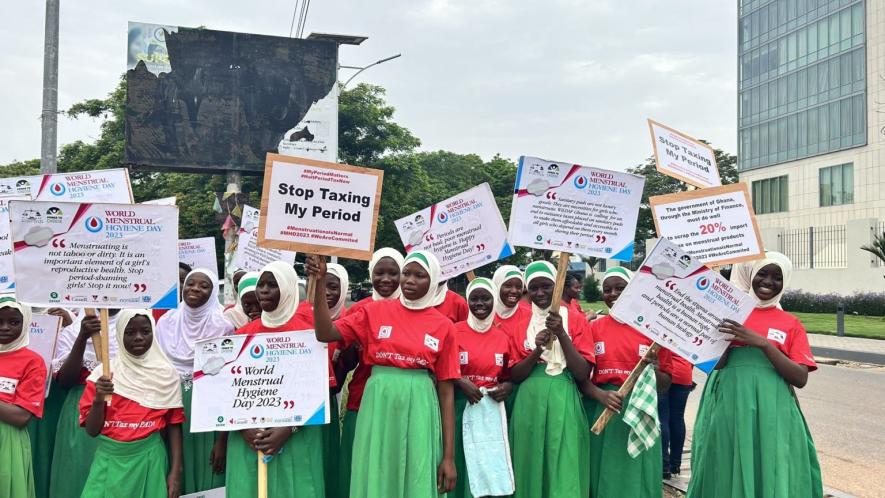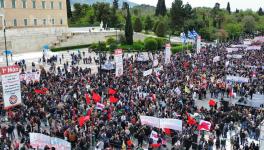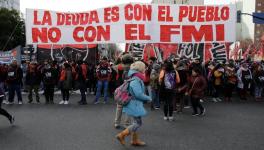‘Bleed with Dignity’ Struggle: Ghana Activists Reject High Taxes on Menstrual Products

Young women and girls in Ghana protest against the tax on menstrual hygiene products in May 2023. Photo: Yebetumi/Twitter
On June 22, Ghanaian activists will take to the streets of Accra for the “Don’t Tax My Period” parade and placard march. Organized by the Women’s Wing of the Socialist Movement of Ghana (SMG) in collaboration with NGOs, Yebetumi and Obaasima, the action will draw attention to the pervasive yet often overlooked issue of period poverty. The mobilization takes place as anger builds over the heavy taxation of menstrual hygiene products.
Ghana is facing what is perhaps its worst economic crisis in a generation, as rising costs have exerted pressure on the majority of households in the country. This generalized crisis—which has made it difficult for people to afford even basic essential goods—has had a disproportionate impact on vulnerable groups, including women.
Despite the fact that about a quarter of the world’s population menstruates, 500 million people have been left without access to menstrual hygiene products. Period poverty thus refers to the struggle to afford menstrual products, and the “increased economic vulnerability” menstruating people face due to the “financial burden posed by menstrual supplies.”
According to the Ghana Revenue Authority (GRA), menstrual hygiene products such as sanitary pads and tampons are classified under “Finished Goods” or final consumer goods. As a result, they carry a 20% import tax. Products that are otherwise classified as “Essential Social Goods,” are taxed at zero rate.
Not only is there an import tax on sanitary products, they carry an additional Value Added Tax (VAT) of between 12.5-15%.
As activists are gearing up to march for the removal of these taxes, Pan Africanism Today hosted a discussion to examine how these taxes exacerbate period poverty in Ghana, titled, “Gendered Cost of Living: Luxury Tax Impact on Working Class Women” on June 21.
The conversation featured Loretta Ashie, a leader of the SMG’s Women’s Wing and a member of the Standing Committee, and Mikaela Erskog, an educator and researcher at the Tricontinental Institute for Social Research.
While addressing a range of connected social and economic issues, the discussion raised a central theme—what does it mean for people to be able to “bleed with dignity”?
While the GRA may not officially classify any tax as “Luxury Tax,” the use of this term in the discussion more reflected the attitude of the government (not just in Ghana) towards ensuring affordable access to menstrual hygiene products to menstruating people—specifically, not classifying these products an an essential good, when in fact, they are.
Moreover, while there exists a tendency to relegate and reduce issues of menstrual hygiene as “women’s issues,” to be dealt with privately instead of being recognized as matters of political, social, and public health importance, the PAT discussion emphasized the links between period poverty with broader economic crisis.
This is especially pertinent given that Ghana is set to impose a slate of austerity measures in line with the conditionalities attached to a loan agreement with the International Monetary Fund (IMF), as the government contends with a severe debt crisis.
As Erskog highlighted, IMF-imposed austerity measures are notorious for diverting public spending from critical public services such as healthcare and education.
“Austerity is not just a gendered policy; it is also a gendered process in its ‘everydayness,’” as researchers Dana Abed and Fatimah Kelleher have stated.
“All conditionalities that the IMF imposes on debt relief impacts women the most. If the IMF is talking about taking away subsidies on utility bills, or healthcare, you know it is women who will be affected the most,” Ashie said.
She also pointed to the government’s decision to slash benchmark discount on imports from 50% to 30% in November 2022, “this goes back and hits the importer who then brings [this burden] on to us the consumer.”
“Day in and day out, things are getting expensive…and in all this, women are suffering more because women are the people who earn less, we are also in the informal sector, we are not getting pensions…in this economic crisis, women are facing triple or ten times more pain than others in general.”
Speaking to the specific way in which women face economic exploitation, Erskog noted that about 70% of agricultural products that are used to feed households in Africa are produced by women, “the fact that they are sustaining the working class of Africa, they do not receive social or public services that could balance this [inequality] out.”
“The hiding of women’s contributions to the surplus value of many commodities not only in Africa… whether it’s the textile in Southeast Asia or farming in Latin America… benefits those who are reaping the profit margins.”
Period poverty in turn is also informed by prevailing social norms, including taboos and stigmas which deem menstruation to be inherently unclean or polluting, which impede open discussions around issues related to menstruation.
“Research has shown that aside from the prices of [period] products, girls have to stay off school because there are no toilet facilities, there is no potable water, and there are no facilities for them to dispose of sanitary products.”
This absence leads to a significant loss of learning for children still in school, which might result in girls not returning to school altogether. Meanwhile, high costs of sanitary pads in Ghana has also forced some people to stop using them, resorting to using baby diapers, or even reverting to using pieces of cloth.
“Our minimum wage is 14 cedis, 88 pesewas, which is about USD 1.88, and a menstrual pad is sold for between 15 to 40 cedis… so if a person uses even two pads, they are spending about 70 to 80 cedis. This is about 20 to 25% of their income,” Ashie said.
“25% is gone and then you have rent, utilities…you have to find food…if you have dependents, they [also] have to eat.”
“The government needs to remove these taxes and subsidize sanitary pads and make it free for girls in basic and secondary schools… because this is not a choice.” she said, adding that sanitary products must be considered an essential good.
On June 22, the SMG and the organizations that it is working with will be marching to Parliament to deliver a petition of their demands to the Finance Committee and the Gender Select Committee.
Beyond the protest, the SMG is going to continue its advocacy and work to end the stigma around menstruation and broader societal issues, including access to education.
Get the latest reports & analysis with people's perspective on Protests, movements & deep analytical videos, discussions of the current affairs in your Telegram app. Subscribe to NewsClick's Telegram channel & get Real-Time updates on stories, as they get published on our website.
























